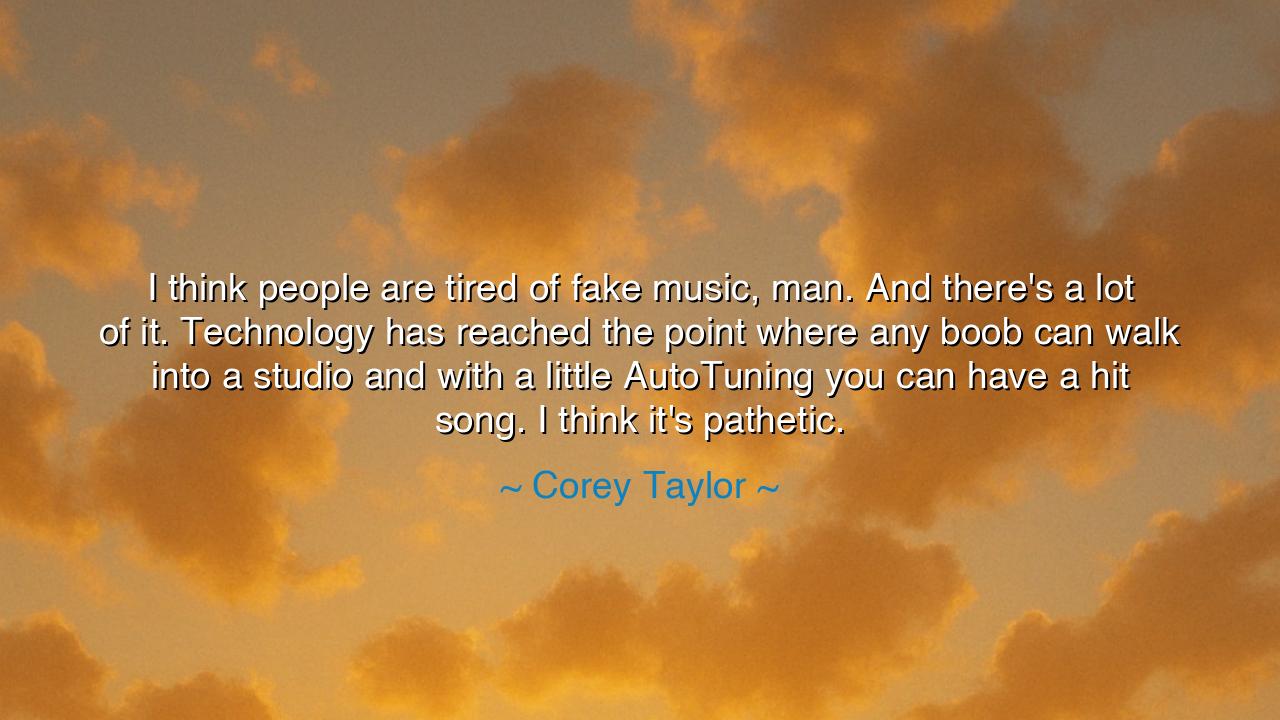
I think people are tired of fake music, man. And there's a lot
I think people are tired of fake music, man. And there's a lot of it. Technology has reached the point where any boob can walk into a studio and with a little AutoTuning you can have a hit song. I think it's pathetic.






The words of Corey Taylor, warrior of heavy music and voice of raw truth, thunder with indignation: “I think people are tired of fake music, man. And there's a lot of it. Technology has reached the point where any boob can walk into a studio and with a little AutoTuning you can have a hit song. I think it's pathetic.” Here, he speaks not merely of music, but of authenticity, creativity, and the decay that comes when art is hollowed out by shortcuts. His cry is a defense of the sacred — that which is born from sweat, discipline, and soul, against that which is cheapened by machinery and deception.
The meaning is fierce. Fake music represents not only artificially tuned voices, but the larger culture of imitation, formula, and disposability. Where once the musician spent years mastering instrument, craft, and performance, now technology allows the unskilled to mimic the sound without the substance. The result may fool the ear, but it does not stir the spirit. Taylor calls it pathetic because it robs both the artist and the listener of truth. Music is meant to bleed with honesty, but too often it is polished until lifeless.
The origin of this critique lies in Taylor’s own journey. As the frontman of Slipknot and Stone Sour, he is known for music that is unrelenting, imperfect, and real — forged from anger, pain, and resilience. His art was not crafted through machines but through relentless touring, screaming lungs raw in front of crowds, and songs carved from lived experience. From this path, he condemns the rise of empty hits created in sterile rooms, assembled by engineers and algorithms rather than lived passion.
History echoes this lament. In the days of classical composers, men like Beethoven and Mozart gave their souls to music. Beethoven, nearly deaf, poured his agony and triumph into symphonies that still shake hearts centuries later. Could such music ever be replicated by a machine? Never. The soul of the artist cannot be manufactured. Or consider the rise of the blues in the fields of the American South — voices cracked with sorrow, yet rich with truth. Those who sang did not need perfection of pitch; their authenticity gave their songs eternal power. Compare this to the disposable, mass-produced tunes of today, and Taylor’s anger is understood.
The lesson is timeless: technology is a tool, not a substitute for soul. When machines replace passion, when formulas replace creativity, when illusion replaces authenticity, art dies. The listener may tap their feet, but their spirit will not be nourished. True music — and indeed true art in all forms — requires struggle, imperfection, and vulnerability. The artist must give something of themselves, something real, for their work to endure.
For modern souls, the teaching is clear. Do not be seduced by the ease of shortcuts. Whether in music, in craft, or in life, resist the temptation of fakery. Seek depth, not polish; truth, not perfection. Let your work bear the marks of your struggle, for these scars are the proof of its authenticity. If you create, create honestly. If you consume, seek that which bears the fire of reality rather than the gloss of fabrication.
Practical action follows. Support artists who dare to be authentic. Celebrate the raw voice, the imperfect performance, the song that bleeds rather than merely entertains. If you create, discipline yourself in your craft — let skill and passion, not machines, be your foundation. Use technology wisely, but never let it replace truth. For in art, as in life, the soul hungers not for the false but for the real.
Thus, let Corey Taylor’s words endure as a warning and a challenge: a song without truth is noise, a song without soul is emptiness. The world may be flooded with the fake, but those who stand firm in authenticity will outlast the tide. For it is not perfection that makes art eternal, but honesty — the kind that speaks from the depths of human experience, and pierces the heart across generations.






AAdministratorAdministrator
Welcome, honored guests. Please leave a comment, we will respond soon